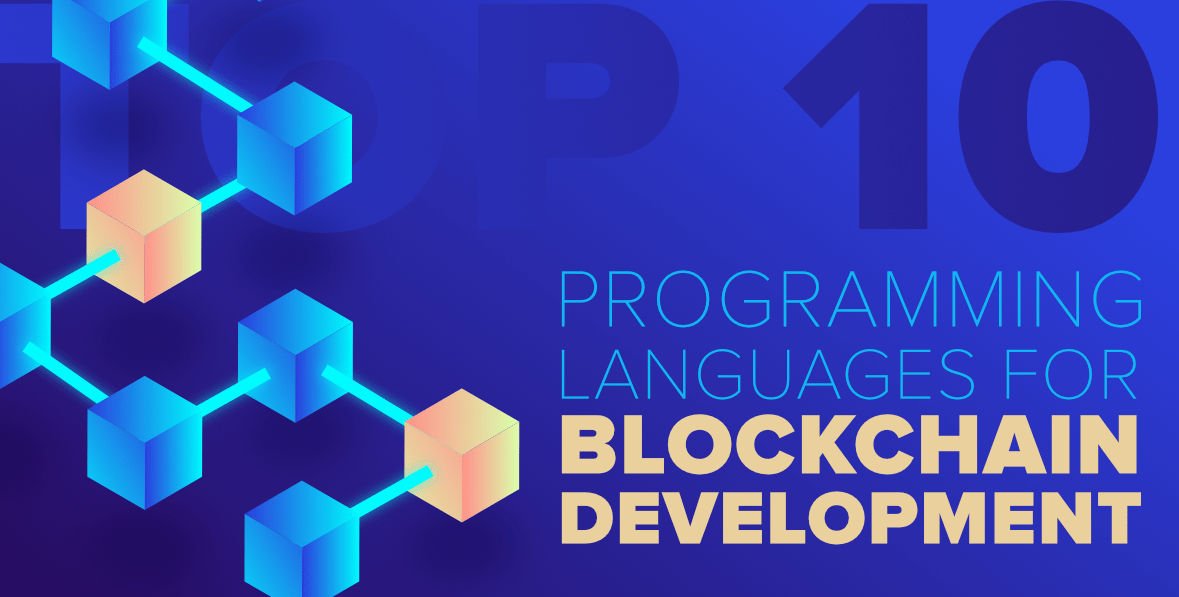A blockchain refers to a digital list of data recordings that are ever-expanding. It includes data items arranged in a certain order and connected and protected by encrypted certificates. Even though it precedes Bitcoin, blockchain technology is a fundamental part of most cryptosystems. It is a randomized, global, and open shared ledger that maintains a continuous record (chain of blocks) of all confirmed operations.
The need for the best programming language for blockchain development and its application is growing; therefore, it is critical to maintain your position as a leader in the industry. Check Blockchain certificate course to learn how to become a blockchain developer.
Top Programming Languages for Blockchain Development
If you are a Blockchain enthusiast looking to learn the top programming languages, the best Blockchain Solutions Architect online course is made for you. Let us explore the topmost programming languages one by one:
1. Solidity
This is one of the best blockchain programming languages. Gavin Wood proposed Solidity in 2014 and is the clever brain behind its innovation. It is influenced by Java, C ++, and Python and is the best language for smart contracts.
- Pros
- Easy to learn
- Stable and flexible
- User-friendly
- Flexible, dependable, secure, and precise medium for various sources in creating smart contracts between two parties
- Application binary interface provides multiple type-safe functions in Solidity
- Cons
- Not very easy to reason
- The contract can’t have extra features
- Might not achieve enough code coverage at times
- Not enough documentation of known vulnerabilities
- Use Cases
- Ethereum smart contracts are written in Solidity.
- The Ethereum development ecosystem is massive and is currently one of the most important parts of blockchain development.
- Solidity is one of the most widely used languages in smart contract development.
2. Java
In terms of popularity and utility, Java is a strong competitor to C and the best language for blockchain. Java has a plethora of Application Programming Interfaces that include numerous java Software components, bundles, integrations, and so on. It is also one of the top blockchain programming languages.
- Pros
- Portable across platforms
- Run on universal Java machine, thus user friendly
- Robust
- Memory cleaning is easy
- Cons
- Dynamic
- Very transparent
- Uses Cases
- The probability of Java is useful in Blockchain.
- Also used in Hyperledger Fabric, IOTA, NEM, and NEO
3. Python
Python, a comparatively recent programming language used in blockchain, is often the first choice for novice coders due to its simple syntax, similar to the English language. Python is one of the most popular blockchain programming languages available.
- Pros
- Can handle big data and perform complex mathematics
- Works on different platforms (Windows, Mac, Linux, Raspberry, others)
- Best programming language to learn for blockchain, which when compared to other programming languages, the syntax allows developers to write programs with fewer lines.
- Quick prototyping
- Cons
- Mostly used as a server language
- Not very smart
- Under documented libraries
- Use Cases
- Writing smart context for Hyperledger
- contracts for NEO
4. JavaScript
The JavaScript engine drives modern web development. Its features improve when combined with HTML and CSS. JavaScript is the best coding language for blockchain and is primarily used to build highly interactive web pages.
- Pros
- Object-oriented
- Prototype-based
- Supports functional programming, and is therefore, the most used programming language for blockchain.
- Good at handling asynchronous actions and can handle communications easily between nodes.
- Cons
- Dynamic
- Interpretation depends on the browser
- Anyone can view the code
- Use Cases
- JavaScript connects the frontend of the application to the Ethereum network and smart contracts.
- Hyperledger Fabric SDK for node.js is a huge framework often used in the IT industry and corporations.
5. PHP
PHP is a popular programming language used for blockchain and an open-source, platform-independent language powered by Zend Engine. This can be developed on a variety of operating systems and comes with a highly configurable library in its production, that makes the work of blockchain developers easier.
- Pros
- Easily installed and ready. It is one of the best programming language for smart contracts
- Can be used with any operating system
- Simple, straightforward, and easy to learn
- Cons
- Not very good with large databases
- No modifications are allowed
- Frequent runtime errors
- Use Cases
- Mobile App development companies and solutions for different complexity ranges
6. C++
This is one of the best programming languages for blockchain. C is rich in run-time morphology, function overstretching, and multithreading. It enables developers to shape the data to their specifications and is considered the best language for blockchain developers.
- Pros
- Object-oriented programming language used in blockchain technology, thus making it easy
- Secure and developer friendly
- Comparatively fast and powerful
- Cons
- Incapable of dynamic memory allocation
- Becomes complex if long programs are written
- Platform-specific
- Use Cases
- It is widely used in developing Blockchain applications such as Stellar, Ripple, and Bitcoin.
7. C#
Microsoft’s one of the most widely used open programming languages pronounced as “C Sharp.” This is the best smart contract language and is extensively used by many developers worldwide. C# employs simple Object-Oriented and Extensible Markup Language or methods.
- Pros
- Rich library
- No issues like memory loss
- Version control is easier
- Acts as a support for distributed systems
- Cons
- Using and interacting directly with hardware is tough.
- No independent compiler
- Execution is lengthy and time-consuming
- Use Cases
- NEO and IOTA are examples of popular Blockchain programming that uses C#.
8. Go
Go is intended to be a sturdy, multi-purpose language that combines the syntax and user-friendliness of modern languages like Python and JavaScript with the performance and security advantages of C.
- Pros
- This language used in blockchain development has a rich standard library
- Flexible and scalable
- Ability to run several programs asynchronously or in parallel
- Fast compilations
- Simple, concise, and safe
- Cons
- Difficult to learn
- Very complicated syntax
- Not a very popular language
- Use Cases
- Go-Ethereum is an important Golang project.
- The most widely used blockchain solution using Go is the Hyperledger Fabric.
- The Loom Network, which has chain code written in Go, is another exciting project aimed at decentralized online games.
9. Simplicity
Simplicity was created to reduce low-level understanding of cryptocurrencies. It is viewed as a chance to provide Liquid Network users with services such as trust-reduced future payments, crypt, and other advanced smart contracts.
- Pros
- Reliable
- Secure
- Cons
- Code optimizers can still be compromised
- Needs to combine functional and formal correctness
- Use Cases
- Reduced complexity and low-level understanding of the Bitcoin Script
- Compatible with the Elements platform, an open-source, Blockchain platform
10. Ruby
Ruby has excellent memory allocation capabilities. This language’s main focus is simplicity and productivity, which makes it developer-friendly and the best language to develop blockchain. It also supports cross-platform development. It supports a multi-paradigm, which means it is functional on multiple platforms.
- Pros
- Multi-Paradigm language
- Huge and strong developer community
- Works on windows as well as PIOX
- Cons
- Difficult to debug and generates a run-time error
- Less flexibility
- Very low processing speeds
- Use Cases
- Through third-party APIs and plugins, Ruby allows developers to frame Blockchain programming.
11. Rust
Rust is widely considered for implementing creative, irreversible, and steady solutions. The language enables open-source blockchain developers to create concise and strong frameworks. It also provides a highly effective method for dealing with configurable states, wonderful source code, increased memory options, and exploring new possibilities based on total opportunities.
- Pros
- New but secure
- Quick and Effective frameworks
- Cons
- Considerably new, thus difficult to understand
- Use Cases
- For building impressive and innovative solutions
12. SQL
SQL is also one of the best blockchain programming languages in 2022. It is used in the blockchain domain to create secure and effective organizational solutions.
- Pros
- Secure and effective
- Cons
- Comparably new and undiscovered
- Use Cases
- Aergo is a prime example
13. Erlang
This language is becoming the top Blockchain coding language and promises the best language to learn for blockchain.
- Pros
- Scalability
- The backend is very strong
- Fault tolerance and immutability
- Cons
- Less famous and very new
- Use Cases
- Constructing peer-to-peer networks in a Blockchain environment
14. Rholang
It is a relatively new language in the digital age. It is a simpler language because you can comprehend the syntax you wrote on display, alleviating the memory load that most developers undergo.
- Pros
- Reliable and secure
- User Friendly and easy
- Speed and accuracy
- Cons
- Very new to the market
- Difficult to process undeveloped programming
- Use Cases
- Rholang uses a functional programming paradigm rather than an object-oriented one.
15. CX
The language can work as a commercial virtual intermediate and is packed with features such as easy access to manipulating programs and the ability to apply forced reductions, pointers, and vectors.
- Pros
- Commercial Features
- Ease of Manipulating Programs
- Cons
- Considerably new and difficult to understand
- Use Cases
- Assembles with Go and gives clients a break from performing arbitrary codes, which has been a significant issue for cutting-edge firms.
- Works well with OpenGL (Open Graphics Library), allowing blockchain developers to gain greater benefits in terms of GPU capacity.
Why Programming is Required in Blockchain?
Programming is an essential requirement to use blockchain to its greatest potential that we’re yet to unlock. Let us learn why programming is a must in Blockchain technology:
- A developer can express the parameters of a smart agreement being executed on the blockchain in programming written in a high-level programming language.
- One of the purposes of employing mathematics in the blockchain is to guarantee that once the blockchain has been built, it cannot be changed, and once a transaction has been verified on the blockchain, it cannot be deleted. As a result, blockchain is appropriate for financial transactions.
- Blockchain networks are self-executing agreements in which the conditions of the participants’ agreement are written explicitly into code lines.
- Blockchain’s capacity to be programmed is what makes it so revolutionary. These applications can go beyond the objective of data in past events to genuinely transact business in real time as governed by the agreement aspects.
Types Of Blockchain Programming
1. Blockchain Architecture Programming
Before a blockchain can be published, important aspects of its architectural style and processes must be agreed upon. This must be coded. For example, before Bitcoin in 2009, the policies and guidelines governing that scenario were written in C . Languages that work closer to the machine, such as C and Java, are commonly used for this type of coding and are the best language for blockchain development.
2. Building a Smart Contract, or Decentralized App (DApp)
The backend software of a centralized application runs on central servers, whereas the backend software of a Dapp runs on a decentralized mentoring network. A DApp, like an app, can have frontend compiled code in any syntax and interfaces that can make backend calls.
Popular Blockchain Programming Platforms
The following are the most popular blockchain platforms available right now:
- Hyperledger: The Hyperledger Sawtooth project was carried out by brilliant minds and business professionals at Intel and the Linux Foundation. Long effective in the technology field, these two organizations collaborated to create a system for creating, executing, and deploying distributed ledgers. The platform enables the maintenance of digital information without the need for a central managing authority. Its goal is to provide customizable blockchain technology with a rich, user-friendly interface for application programming (API). Hyperledger reduces potential risks by ensuring that only parties who want to transact are included in the transaction.
- Ethereum: Ethereum is said to be able to “define, diversify, protect, and commerce almost anything.” Ethereum was a vision in 2013; the creation was started in 2014 by a group of people who wanted to create an accessible, blockchain-based application framework. It was launched on 30th July 2015. It is an accessible platform that allows anyone to develop and run blockchain-based software. No one can own or control the Ethereum platform, which, like the Bitcoin cryptocurrency, runs on a virtual machine that allows for decentralized connectivity and application execution. However, because it is a global platform, it is designed for limited access rather than mass use.
Conclusion
Blockchain technology is expected to have a significant impact on all sectors and industries. Blockchain technology has made it easier for many industries to overcome long-standing obstacles and seize new opportunities. Blockchain establishes a benchmark for having the ability to revitalize the whole economy, including the financial, medical, tourism, and education sectors.
Renowned mentors in Blockchain technology recommend TechDotBit Blockchain certificate course. Through our top blockchain programming courses and certifications, you can learn anything from utilizing cryptographic and crypto algorithms to comprehending the technology that powers Bitcoin.
Frequently Asked Questions (FAQs)
The solidity programming language used to create smart contracts is a high-level language similar to Java and Python and is appropriate for Ethereum, which hosts most NFTs. Many utility-focused NFTs with real-world applications are created using this.
Coding does not imply that you must be able to code your blockchain or grasp the complex math underpinning cryptography. It implies that you will learn to communicate coherently about the various blockchain-based technologies.
The top skills required for Blockchain are
- Algorithm and data structures
- Core blockchain development
- Smart contracts
- Software development experience
- Peer-to-peer networks
- Cryptography
Taking a professional certificate program will help you prepare for this career path. Join the best blockchain solutions architect online course with TechDotBit for an engaging, hands-on, and measurable approach to learning. The online course and credential programs will help you become a professional blockchain developer in 6 months or less.
Start today and improve your blockchain skills with TechDotBit Blockchain certificate course, which brings you a certification from a prestigious organization to demonstrate your proficiency in the blockchain.
A Blockchain Developer’s pay in India typically ranges between Rs. 5,00,000 and Rs. 30,00,000 LPA. As is obvious, the more experience you have and the more comprehensive your skill set, the greater your annual salary will be.








